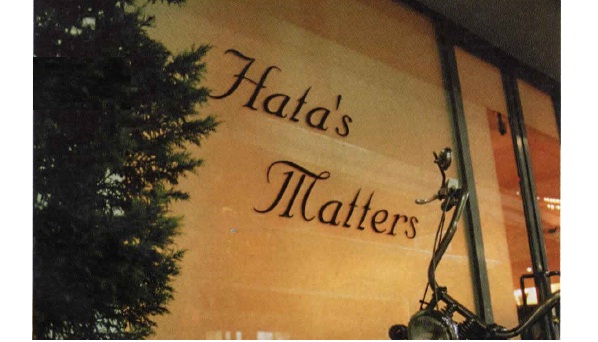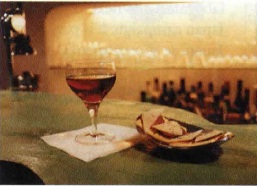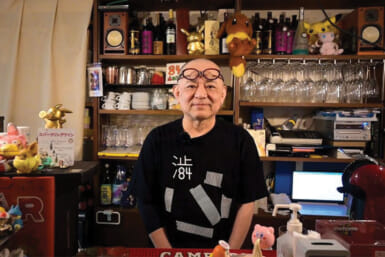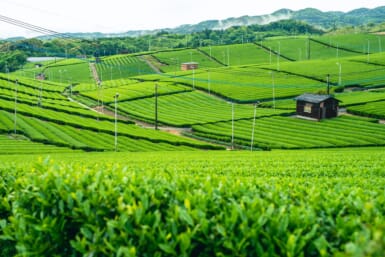by Kumiko Matsuda
ACT 1
A classic Martini made by the Martini Meister keeps its good shape no matter how much time has passed.
Bryan hasn’t shown up. I am getting irritated. Then, a rather “hard boiled” Martini is placed in front of me by the last samurai. Or maybe he is a ronin, a master-less roaming samurai who somehow slipped through the thick castle walls of time. His hair is in a topknot, and his manner is brusque. But this bartender pays an attention to detail in making cocktails and serves them up in thick, bulky glasses.
The Martini is quite strong, and—straight-ahead. Thick and rich, yet sharp and effective. I hold the glass by the stem, which is long and fat. My hand cannot help brushing against it, and I gently caress it with the tips of my fingers to make sure how big it is.
Bryan told me time doesn’t matter here. Hata-san’s cocktails keep in good shape no matter how much time has passed. Well, we’ll see.
ACT 2
Rene Magritte.
My gaze turns to the pure white wall behind me. A hidden projector shines the birds of Magritte into a frame on the wall. Is this not the domain of Arnheim, the dreams of Jung?
The transparent blue. The image, quite soft, of an immense expanse of blue composes the rugged cliffs of the soaring crag; its crest is in the shape of raptorial birds, as if it preys on human fears. This blue is bright, but on the other hand, empty. Soft and hard, gentle and furious. Truth and falsehood, reality and imagination. Psychological reality and actual reality.
Everywhere in this place, these many antithetical concepts are juxtaposed in an attempt to maintain a fragile balance. Is this not depaysement (disorientation by a change of surroundings), the mad maneuvering of a surrealist?
ACT 3
Depaysement – that “alien” feeling.
Not only does this Martini Meister look like a wandering samurai, but he also looks like a Mexican hombre trying to fit in within the confines of the surrounding Azabu Juban community, which in itself is full of depaysement.
A conglomerate of differences: old and new, rich and poor, embassies and little wooden shacks some call home. The high-rent supermarket Nissin (a block away from Hata’s Matters), and the discount greengrocer Bikkuri-ya peddling its cheap veggies 365 days a year.
Cutting edge cosmetic surgeons competing among each other against the backdrop of the old General Hospital. Groups of cute cheerful schoolgirls sharing the sidewalks with what could only be streetwalkers.
ACT 4
A short course in Jungian philosophy.
The Magritte. In one sense, it is the embodiment of synchronicity. This bar is an analogy to the small room that Jung believed existed in everyone’s heart, and can only be reached by descending the steps down to the deepest subliminal self.
ACT 5
Simple is beautiful, and timeless.
The Martini itself is the classic definition of “traditional strong liquor,” and this reminds me of a phrase I heard in “My Life Without Me.” In this movie, the female lead has an affair with this guy and, when she breaks it off, he says something like, “I love you in the traditional way, so I’ll cry in a classic way.”
People tend to make life complicated in various ways, but the most beautiful thing is simplicity because to achieve it is very difficult. And the words “traditional” and “classic” sound so beautiful, too. Like universal truths, I suppose people always love another person “in a classic way.”
ACT 6
Reflection.
The projector casts a reflection onto the glass of the window that faces the sidewalk outside. All those fragments of my imagination are just as fragile as this reflection. This window is supposed to separate the inside from the outside, but the reflections on it are ghost-like impressions of the interior, which somehow seem they are outside, hanging in mid-air.
This place is a mirror that reflects to people whatever is going on in their minds, very much like the Kaleidoscope Mukashi-kan in one corner of the rambling Julian shopping area.
The long, grain-textured grass green counter draws a strange arc, and the napkin illustration of a man drowning in a cocktail glass reminds us of a New York in decades past.
But for Bryan, good old New York is just “A Chorus Line,” since the strange but ample curve of the bar only reminds him of “T and A.” Another fragment?
ACT 7
The parallel worlds of our relationship.
It occurred to me the two of us are in totally parallel worlds, and this feeling might have been emphasized by the vertical interval between the main floor and the bar counter. The interior here is impeccably styled, though you have to watch your step!
ACT 8
Under the light of Tokyo Tower.
Bryan has to leave now. He must return to his home and family. Now that I know about them, everything has changed.
As we step out of the bar, a ’79 Harley Davidson chopper is resting its wings, the pinnacle of poise, the essence of cool. It is yet another fragment of depaysement, being uprooted from its American birthplace to roam the roads of Japan.
He turns right to walk up toward Azabu Juban. I go left, and in the cold air the buildings loom as large black shadows. In a valley between them, the brilliant Tokyo Tower soars upward. Again this year, for only three days, it will be brilliant with Christmas illumination.
It will be like a towering candle, with a brilliant but short life.
Much like when worlds collide. The parallel worlds of Bryan and me.
Hata’s Matters
2-30-9 Higashi Azabu Minato-ku, Tokyo
Tel. 5575-7507
Open Monday to Saturday, 6 p.m. to 4 a.m. Sunday, 3 to 11 p.m.
Closed: National holidays
Spirits: ¥1,000
Cocktails: ¥1,000










